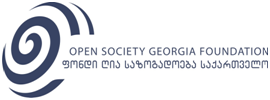


Project Title: “Monitoring of Information (Internet) Resources of Public Authorities of Georgia”
Total Budget of the Project:$64 000.00
Project is financed by:
The Open Society Institute and The Open Society Georgia Foundation ($60 000.00)
The National Security Archive ($6 000.00)
Duration of the project- 12 months.
Overall Objective:
Promoting the development of freedom of information, e-Transparency and e-Governance by auditing official web-sites of public authorities.
In April 2010 the Institute for Development of Freedom of Information (IDFI) launched a project “Monitoring of Information (Internet) Resources of Public Authorities of Georgia”. Project is the extension of the activity that the IDFI carried out in 2010 - Monitoring of Governmental Agencies' Informational Recourses.
Within the project the IDFI will provide auditing of official web-pages of public bodies of Georgia to assess the level of electronic transparency and access to information.
The Aim of the Project:
- To increase the level of transparency of public authorities in Georgia;
- To promote the development of freedom of information;
- To initiate changes in Georgia legislation on Freedom of Information;
- To develop e-Governance and e-Transparency in Georgia.
Long-term Objectives:
The project“Monitoring of Information (Internet) Resources of Public Authorities of Georgia”targets the challenges of Georgian central and regional government institutions in the areas of their information transparency, electronic governance and electronic democracy. The work undertaken by the Institute aims to establish an open information space in Georgia; to increase public awareness of the rights provided under Freedom of Information; to achieve a higher citizen participation in regional (local) and central government processes; to improve skills and qualification of state officials in the areas of information transparency and electronic governance; and to put in place a system that will enable a more interactive dialogue between and among the representatives of local communities, CSOs, media, and government structures.
Short-term Objectives:
- To support the development of civil society and high democratic values by increasing the awareness of population (individuals, legal entities, governmental officials) about their right to request and access public information;
- To support publicity and openness of information that is of a public and social importance with every method and activity that is defined by law;
- To support evolvement of e-governance in Georgia, that will be of modern standards;
- To achieve advancement of investigatory journalism and to increase the quality of an independent media;
- To support governmental institutions in development of legislative base on freedom of information; To provide research and practical activities in means of improving and resolving problems in Georgian legislative system and enhancing democratic principles in the legislation;
- To participate in drafting and lobby for the passage of a democratic and detailed legislation on freedom of information – the Freedom of Information Act (FOIA) and the Public Online Information Act (POIA) which will regulate citizens’ constitutional right to search, request, have access to, receive, and disseminate public information. The POIA act will specifically regulate the on-line availability of public information.
Anticipate Results & Problems Solved:
The project(s) executed by the Institute will improve transparency of state institutions at all levels; it will facilitate the development of a more open, accountable and responsive government, thus improving the efficiency of the government agencies’ work. It will strengthen the civil society and promote civic engagement including citizen participation in requesting for public information and in other government processes. Finally, the project(s) will put into place stronger mechanisms for carrying out coordinated work between non-governmental actors and state officials to address issues of common concerns.
Beneficiaries:
- Citizens of Georgia (and of other countries) who benefit from the increased government accountability and openness;
- Government of Georgia, central and municipal public agencies that benefit from an improved inter-agency communication, increased work efficiency and an overall advancement towards the modern standards of e-governance and e-democracy;
- Public officials who will acquire new skills and qualifications in the field of e-governance;
- Journalists and representatives of the independent media;
- Civil society organizations (CSOs) and private sector representatives;
- International Society (international organizations, donor organizations, diplomatic corps) who can better monitor and audit the development of the democratic processes in Georgia via improved and transparent official government web-space of Georgia);
- Wide sector of the society in general.
Carrying out the tasks
In the framework of the Project the Institute will address issues of transparency and accountability of the Georgian public administration on the central level.
- To monitor over those ministries and legal entities of public law (LEPLs) that were studied during the Monitoring 2010 project to enable a continuous reporting on government institutions of a particular interest or a greater importance;
- To expand the target group of the project “Monitoring of Information Resources” and to include all bodies of the Executive Branch of the Government of Georgia (Agencies and sub-agencies under the Ministries and the Government of Georgia, Regional Governments), Independent Regulatory Bodies, Legislative Branch of the Government of Georgia;
- To develop and expand the existing monitoring methodology;
- To provide advocacy work for the Freedom of Information legislation change in Georgia;
- To work on a new justice initiative which will outline and regulate standards of online public information availability for government institutions;
- To emphasize the need for an active outreach to public institutions and a non-commercial based engagement via providing recommendations and consultations to the monitored public authorities;
- To raise the public awareness towards the issue of freedom of information, as well as to perform a successful advocacy of the organization’s activities and the effective delivery of Institute’s objectives to a wider public by the media, social networks and the Institute’s web-page;
- The IDFI will continue to use social media as a powerful tool for maintaining an interactive communication with public of Georgia;
- Upon the completion of the monitoring, the IDFI will carry out a comprehensive analytical work that will include several assessments of the project and its results.
Other issues to be covered within the framework of the Monitoring 2011 program include:
- Strengthening of the civil society and popularization of democratic citizen engagement in operational governance processes;
- Building close cooperation with an independent media and vitalizing investigative journalism;
- Developing and applying tools that will enable closer and more productive collaboration between and among the representatives of the Civil Society Organizations, local community and the independent media;
- Adopting advanced applications and mechanisms for effective and systematic communication with public authorities and introducing a whole new interactive dimension to the relationship between the Government of Georgia and non-state actors.





